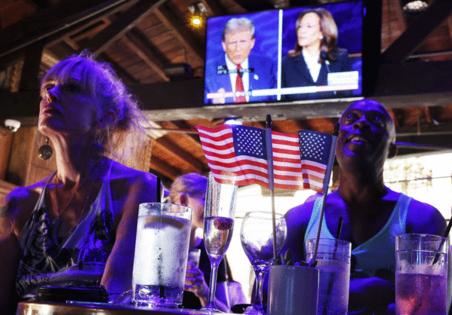More Americans lean Republican than Democrat. What that means for the presidential election is uncertain
Published in Political News
As national polling continues to show a neck-and-neck race to the finish between Democrat Kamala Harris and Republican Donald Trump, more voters have recently said they lean Republican than lean Democrat — a first for this stage of a presidential race, according to a new report from Gallup analyzing decades of its own polling.
An average of Gallup surveys between July and September showed 48% of adults identify as a Republican or lean toward the party versus 45% who said the same for the Democratic Party.
Republicans have never had an “outright advantage” like that in the third quarter of a presidential election year, the polling firm reported.
It was also just one of several factors in Gallup’s recent surveys that would typically indicate an upcoming Republican presidential win, including a majority of voters’ preferring the GOP handle the economy and other national issues, the group reported.
“The political environment suggests the election is Trump’s and Republicans’ to lose,” Gallup reported.
Matthew Foster, who teaches political science at American University, said partisan lean does typically have a strong correlation to voting.
And considering all the normal factors this year — a Democratic incumbent president, negative feelings about the economy and more — this would, historically, be a year in which Republicans would do well, he said.
But that might not be the case this year, he said. How party affiliation impacts voting in this kind of unprecedented election year — Democrats swapping out their nominee late in the process, Trump surviving two apparent assassination attempts — is making it harder to rely on the typical indicators of success, Foster said.
“In a normal year this would mean doom and gloom for the Democrats,” he said. “But this isn’t a normal election year.”
Harris has maintained a slight lead in national polls. Recent weeks of polling averages show her up by 2 to 3 percentage points, according to RealClearPolitics, The New York Times and 538. Analysts have warned the race is extremely close, particularly in seven battleground states that could determine the results of the Electoral College.
“The truth of the polling work right now is it’s a tossup,” said Joseph Dietrich, a Towson University assistant professor of political science who also said this year’s abnormalities make it impossible to single out party affiliation as the defining indicator of success.
Even beyond the political earthquakes this summer, Dietrich cautioned that other factors are still developing that will influence the results. Those include voter enthusiasm, the technical aspects of voting laws enacted since 2020 and the fact that Harris still might have more room to improve because of her late entry in the race. (The Gallup polling analyzed in its recent report occurred while Harris was introducing herself to voters and most of it was before her debate with Trump in September.)
“Those other elements are going to play a fundamental role,” Dietrich said.
While any number of factors could make a significant difference in places like Pennsylvania or Arizona, Maryland is not one of those battlegrounds.
President Joe Biden beat Trump by 33 percentage points in the state in 2020, and Foster said he would be surprised if Harris’ expected win in Maryland is significantly smaller than that even with the national shift toward Republicans in Gallup’s surveys.
Where Maryland might be a test case of partisanship, though, is in the U.S. Senate, he said.
Democrat Angela Alsobrooks is trying to nationalize the race by tying Republican Larry Hogan to Trump and the Republican Party, saying the former two-term governor would be a reliable vote for the GOP even as Hogan claims his independence and his opposition to the former president.
Hogan is bound to perform better than Trump in Maryland, Foster said. The question is whether partisan factors will keep Democrats who have supported him in the past from pulling the trigger for him again, this time splitting their ticket between a Democratic presidential nominee and a Republican Senate candidate.
“The Marylands of the world, the Ohios (where Democratic U.S. Sen. Sherrod Brown is running for reelection in a red state), these are going to be places that really will test whether split ticketing exists in today’s polarized society,” Foster said.
_____
©2024 Baltimore Sun. Visit baltimoresun.com. Distributed by Tribune Content Agency, LLC.




























































Comments